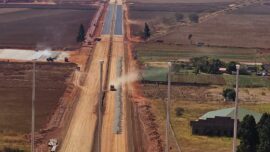
Key considerations when choosing a project contractor
Choosing the right project contractor is crucial for the success of any construction or infrastructure project. Here are some key recommendations for clients to keep in mind:
Reputation and Track Record
Look for contractors with a strong reputation in the industry and a proven track record of delivering high-quality projects on time and within budget is one of the most important considerations. Clients need to consider contractors’ experience in similar projects and their ability to meet their specific requirements in line with the available budget.
Qualifications and Credentials
Ensure that the contractor is properly licensed and insured to perform the work required for your project. Certifications, qualifications, and memberships in relevant professional organizations are also important depending on the magnitude of the project.
References and Recommendations
Hearing from the contractors the contractors themselves might not be enough. It is also important to ask for references from past clients and projects and follow up on them to gather feedback on the contractor’s performance, reliability, and professionalism. Recommendations from trusted sources can provide valuable insights into the contractor’s capabilities.
Financial Stability
Assess the financial stability of the contractor to ensure they have the resources to complete the project without financial constraints or delays. Although there might be confidentiality issues, requesting financial statements, bonding information or evidence of adequate insurance coverage might be helpful.
Project Management Approach
Evaluate the contractor’s project management capabilities, including their communication practices, scheduling methods and ability to coordinate subcontractors and suppliers effectively. A well-organized and efficient project management approach is essential for keeping the project on track.
Safety Record and Practices
Prioritize contractors with a strong commitment to safety and a demonstrated record of maintaining safe worksites. Inquire about their safety policies, training programs, and incident history to ensure compliance with industry standards and regulations.
Quality Assurance and Control
Discuss the contractor’s approach to quality assurance and control to ensure that the project meets your standards and specifications. Inquire about their quality management processes, inspection procedures and commitment to delivering workmanship of the highest quality.
Cost and Budgeting
Obtain detailed cost estimates and proposals from potential contractors and compare them based on scope, pricing, and value-added services. Be wary of unusually low bids that may indicate potential quality or performance issues and ensure that the contractor provides transparent pricing with no hidden costs.
Compatibility and Communication
Assess the compatibility and communication style of the contractor to ensure a productive working relationship throughout the project. Effective communication and collaboration are essential for resolving issues, addressing concerns and achieving project objectives.
By considering these factors carefully and conducting thorough due diligence, you can select a project contractor who is capable, reliable, and well-suited to meet the needs of your project. At Gush Contractors, these key considerations are always a priority as we take on various projects.





0 comments
Write a comment